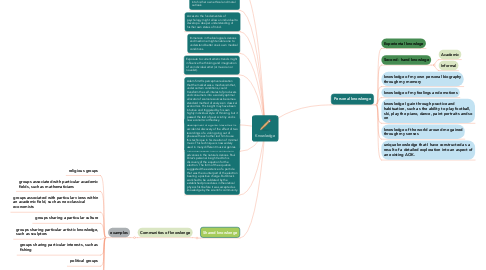Knowledge
by Sophia Tamak


1. Shared knowlenge
1.1. Communities of knowlenge
1.1.1. examples
1.1.1.1. religious groups
1.1.1.2. groups associated with particular academic fields, such as mathematicians
1.1.1.3. groups associated with particular views within an academic field, such as neo-classical economists
1.1.1.4. groups sharing a particular culture
1.1.1.5. groups sharing particular artistic knowledge, such as sculptors
1.1.1.6. groups sharing particular interests, such as fishing
1.1.1.7. political groups
1.1.1.8. national groups
1.1.1.9. ethnic groups.
1.1.1.10. family groups
2. Individual research can contribute to advances in the natural sciences. Paul Dirac’s personal insight led to his discovery of the equation for the electron. The form of the equation suggested the existence of a particle that was the counterpart of the electron bearing a positive charge. But Dirac’s work had to be validated by the established procedures in theoretical physics first before it was accepted as knowledge by the scientific community.
3. Individual artists can contribute to the development of a genre. Steve Reich’s accidental discovery of the effect of two recordings of a violin going out of phase with each other led him to use this technique in his creation of minimal music. This technique is now widely used in many different musical genres.
4. Adam Smith’s perceptive realization that the market was a mechanism that, under certain conditions, could transform the self-interest of producers and consumers into a socially optimal allocator of scarce resources became a standard method of analysis in classical economics. His insight may have been intuitive and triggered by his own highly individual style of thinking, but it passed the test of peer scrutiny and is now economic orthodoxy.
5. Exposure to current artistic trends might influence the thinking and imagination of an individual artist (or musician or novelist).
6. Immersion in the biological sciences and medicine might enable one to understand better one's own medical conditions.
7. Access to the fundamentals of psychology might allow an individual to develop a deeper understanding of his/her own states of mind.
8. A course in ethics or moral theory might allow a student better insight into his/her own ethical and moral outlook.
9. Reading a history of one’s own nation might give a deeper understanding of one’s own past.
10. Personal knowlenge
10.1. Experiental knowlege
10.2. Second - hand knowlege
10.2.1. Academic
10.2.2. Informal
